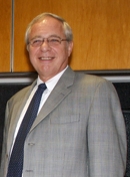
Alan D. Cherrington, Ph.D.
Professor of Molecular Physiology & Biophysics, Professor of Medicine, and
The Jacquelyn A. Turner and Dr. Dorothy J. Turner Chair in Diabetes Research
Research Specialty:
Regulation of Hepatic Glucose Metabolism
Research Description:
A decade ago the synthesis of glycogen which occurs in the liver after oral glucose feeding was thought to be the result of the ingested glucose triggering insulin release and the insulin in turn causing the liver to take up and store the glucose. It is now clear that this storage response is much more complicated than first thought. We now know that another signal, as yet poorly understood, is involved in activating the liver, and further, that much of the glycogen deposited does not come "directly" from ingested glucose but "indirectly" from 3-carbon precursors which enter liver glycogen via the gluconeogenic pathway. We are currently using a chronically catheterized dog model to study the physiology of this "new" signal and the conditions under which liver glycogen is synthesized via the "direct" or "indirect" routes.
Remarkably, if the body is exposed to an insulin level 30 times normal, the resulting hypoglycemia will be limited to a level compatible with life. The reason for this life saving response is that the stimulatory effect of insulin on glucose utilization and its inhibitory effect on glucose production are limited by a variety of hormonal and neural mechanisms. We are currently investigating the role of each mechanism in limiting insulin induced hypoglycemia using conscious dogs. In addition, we are studying the ability of the brain to sense and respond directly to insulin via vertebral and carotid artery infusion or insulin infusion into the 3rd ventricle. We are also examining the defects which occur in counterregulation in diabetes.
We continue to define the actions of various hormones (insulin, glucagon, epinephrine, cortisol) and neural mediators (norepinephrine, acetylcholine, cGRP, NPY) and drugs on glucose production (glycogenolysis and gluconeogenesis) and utilization by the liver.
Our experiments are carried out in vivo using transgenic mice, the conscious dog and man or in vitro using perfused liver and isolated liver cells. Control over various aspects of the endocrine and/or nervous system is gained using pharmacologic and/or surgical techniques. The rates of glucose production (glycogenolysis; gluconeogenesis) and utilization, as well as ketone body production and clearance are assessed using tracer and arteriovenous differences techniques.